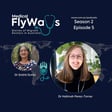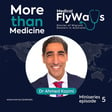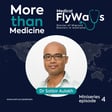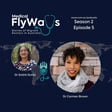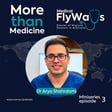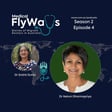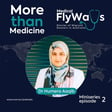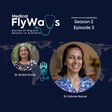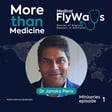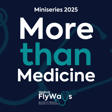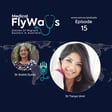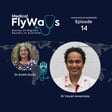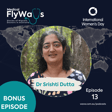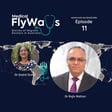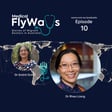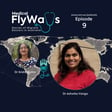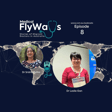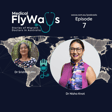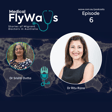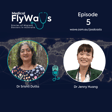Become a Creator today!Start creating today - Share your story with the world!
Start for free
00:00:00
00:00:01

Episode 12 - Dr Ziad Basyouny
Dr Ziad Basyouny is not only an accomplished GP who owns multiple GP practices, he will soon be running as an Independent for the Western Sydney seat of Watson in this years federal election. When arriving in Australia, Dr Basyouny worked as a computer salesperson and a cleaner at McDonald's for months before he landed his first medical job in Queensland.
Having worked at the Western Sydney Health District running their Hospital in the Home Department, Dr Basyouny returned to practicing medicine while forging his political career.
Recommended
Transcript
Introduction and Background
00:00:01
Speaker
Medical Flyways, The Untold Journeys of Migrant Doctors in Australia.
00:00:13
Speaker
Welcome, Ziad.
Professional Roles and Contributions
00:00:14
Speaker
Thank you for agreeing to be on the podcast. And I'm going to start by letting you do the introduction for yourself and share as much of yourself as you're happy to.
00:00:25
Speaker
My name is Zeyad Basuni. I'm a general practitioner, a doctor. I'm an overseas training doctor, a married man with four kids. and All of us are family of six. My wife says that we're five kids and her, but yeah she's a that's her opinion. I'm a dual citizen of Australia and Egypt.
00:00:49
Speaker
This is basically the definition i live in sydney i'm a fan of soccer i'm a little fan i would call myself. It's interest but i tend to like things on the left and i tend to like things on the right so it's really a big mix but yeah i'm not i'm not anchored by any ideology when it comes to politics.
00:01:09
Speaker
Awesome. Yeah. And that's fantastic.
Journey to Australia
00:01:11
Speaker
And I'll add that amongst the other ah things that I know about you, you're also a practice owner of GP practices and have previously been the lead for a hospital service as well.
00:01:24
Speaker
Yes, I still own multiple practice. I'm a shareholder in them. I serve on a couple of school boards. I'm being asked to serve on a board for an aged care service that would be ethnically oriented. Being a doctor from an ethnic background, you kind of get people asking you to help them. And well I helped establish the COVID ah response for us in the local health district.
00:01:50
Speaker
And then I moved on to run the Western Sydney Local Health District to hospital in the home department for the whole of Western Sydney Local Health District for about three years. But now I'm back practicing medicine. Awesome. I think that's been a great introduction for anyone that's you know listening in and doesn't know a lot about Australian general practice, which brings me to my usual question of why did you choose to come and work and live in Australia? Oh, that's a very, very complicated question.
00:02:19
Speaker
I was lucky enough that my parents, well, my father threatened me with his gun and pushed me to do medicine. I did medicine against my will. and It was a joke, obviously. But my father wanted to be me to be a doctor in Egypt. It's a big thing. It's everywhere. It's a big thing. I never wanted to be a doctor. He was a a good police officer, really works hard, very, and I would say,
00:02:45
Speaker
low middle income class in egypt you know sc screaming by every month not corrupt so we didn't make it didn't make a lot of money so we were under the pump so i decided that when i went to my last couple of years of of high school that i want to be a police officer like my dad but i will not be like him i'll be a corrupt police officer so And he didn't like the idea of me being a corrupt police. I was going to be good at it, but he didn't like the idea. So he pushed me hard in my last year of of high school. And somehow I managed to get into med school. He ended up choosing what you want to do on the day of choosing what you want to do. He brought his gun home and he said, what are you going to choose? So I knew the message and didn't do anything. I just understood that he was joking, obviously. And he put down medicine and then I ended up in medicine during my
00:03:33
Speaker
Life in Egypt, I was very disgruntled with the political system, the corruption, and I always thought that there is something better than what I'm
Medical Studies and Overseas Ambitions
00:03:42
Speaker
doing. there and there must be like Somewhere there must be less corruption. It can't just be that way for people who don't know. When you live in specific countries, corruption is probably... Out of your everyday life? Yes, it's it's probably the most proper currency. Whatever you whatever you know is not really Helping you to you know and how can you get through to them or who you can buy off with corruption? So I didn't just didn't like that and I could handle living there So in my so med school in Egypt is six years six and a half years plus Intern so you don't get your full papers. Do you do your interview? It's around seven and a half years by year four I knew I needed to leave Egypt and I started planning fifth year I went to the US for six months and And there's no contradiction between being a middle class family and being able to travel. oh yeah so yeah i agree What happened is my father to entice me to do medicine. He said, if you get into medicine, you'll never get in when I was in high school. Oh, you got an overseas trip. Like I'll book you an overseas trip. And I wanted to see overseas. I've never been out of Egypt.
00:04:47
Speaker
So when i decided that it's obviously went to med school never had the money to do it when it started to when i ended up in medicine and then i decided in fourth year that it's not the place that i think i can live there all my life and i was. 18 i was 18 when i decided that i told him i'm planning to do that and he said to me look one of our uncles one of his family members lives in greece so he he serves as the.
00:05:13
Speaker
you know something within the embassy of egypt is it like i can send a degree is it. It's not gonna cost that much it's only a couple of hours flight from car so it's not too far but you know finish your uni and then fourth year i didn't like a finished uni but i mean never thought about traveling in fifty years i thought now i need to plan my life us is the most probable place i need to just go and see it myself and a friend of mine was going to the uk so he's gonna go to the uk i was gonna go to us and then try to compare notes and see which ones that would be the right place to
Exploration of Career Opportunities
00:05:47
Speaker
go. So I told my dad I'm going to go to the US. He said, you'll never be able to get a visa. It's very difficult to get a visa to the US.
00:05:53
Speaker
So I started doing some research. By the way, I found an Indian forum in 2018 that talked about how to get a visa. So I followed what the guys wrote. Might have been your cousin or something. We never know. You never know. So I followed what the guy wrote on the forum, on the post, and then I got the visa. So when my dad said, I got the visa, he said, well, now I have to make it travel. Let him go, yes. Yeah, well, because I promised.
00:06:19
Speaker
So he literally took money from the savings he saved to to help me when i finish mid school and said this is your money try not to lose it i'm taking it from the future and just. Use it yourself i went to the us and then it was very competitive and i was there during september eleven and and eighteen.
00:06:39
Speaker
I was 19 years old in the US and New York in September 11th, Muslim Egyptian. um um I look scary anyway, so what about in around September 11th? Actually, one of the hijackers, his name was Zad. Normally, Zad, my name is written totally different. It's Z-Y-E-A-D.
00:06:58
Speaker
I write it's it as IAD and the guy who wrote it's it as IAD is like, and normally many people write it differently. Why? You are the only one who chooses to write it in the same way like me. So when I saw the US, it wasn't the place to be. It was very competitive. It's not that I don't want to be competitive, but I've always thought that after working very hard, you'd always want to have, you know, when you reach the top of the mountain, you always want to relax.
00:07:21
Speaker
And in the US, there's no relax. If you're, if you're a physician, did this always work? I remember I was staying in a, in a room or in a flat where there's two other flatmates where a surgical trainee in Flushing Meadows, which is where they play the tennis. So the Flushing Medical Center or something, he was the surgical trainee in there was Egyptian and a respiratory physician. It was also Egyptian that works somewhere else in Manhattan somewhere.
00:07:50
Speaker
I remember the physical trainee used to leave at six o'clock in the morning and come back at one o'clock. The specialist was the respiratory physician used to leave at seven and come back at 10. I was like, he's the specialist, this is the trainee. What's the difference? I asked the trainee, I said, why is he coming back late? He said to me, well, he has to see all his patients and he has to write down, he has to document everything. It's very litigious and I was like,
00:08:20
Speaker
but What's the difference between a trainee and a and a boss, said oh maybe a bit more money, but they work as hard as each other. I don't want to do that. So when I went back to Egypt, I told my friend, I don't want to go to the US. And I'm telling you right now, it's not the place for you or me. It's very competitive. You do not rest even when
Settling in Australia: Challenges and Breakthroughs
00:08:39
Speaker
you get to the top. of the mountain and then you know finish your fellowship or gain your certification. And he said, no, the UK is totally different. its This is the road. This is the way people work. And even if you don't get a consultant job, you can work as a self-level grade, which is like a CMO or a career medical officer. And you can live a nice life. And I thought, I'm a Liverpool fan. It just worked well. I go to the UK. I live anywhere. And then I can go watch Liverpool games. And life is simple. i
00:09:07
Speaker
even if i don't get into a specialty or finish the fellowship i can still work in enough money not too far from my parents need you. Not too far from the middle east if i want to live in the middle east not too far from liverpool which is football soccer that i like in the start of the internet that wasn't your fourth year yeah it's nice if i went to new five and then now yes the biggest year it's eighteen months.
00:09:32
Speaker
In the middle, I managed to meet an Australian girl who became friends and then things developed and and I wanted to see how she lives in Australia. So I came to visit after my 10 years. I finished my 10 year and then they came to visit and actually stayed in their house and they're Egyptian too, like me. So they host me in their house, but it wasn't meant to be that we didn't, we didn't, it didn't happen when I, when I, when I lived their life, I thought, I can't live that. So we were somehow separated and then.
00:10:02
Speaker
For whatever reason, I finished the exams for the UK, the Plaid, when I did the English, I did everything. I didn't go to the UK, went to Australia and worked as a computer salesman and a cleaner in McDonald's. It might cleanse in Brisbane. I know what it is. as I've got a lot of stories about that place, but yeah, you can talk about it later. Then we had one that was looking through the internet, trying to find jobs, something close to health and medicine. And then yeah I found at that time, every state, with there was no NDIS, every state has got some support for disability patients. So there was an ad you know looking for a health worker or something to support a disability. You need to have a car or a license. you know They give you enough money to drop the person or take them or feed them or something like that. So I called that place. It was a recruitment agency. And then the lady talking to me said was on the phone saying,
00:10:56
Speaker
What do you mean you're a doctor and you can't find work? That was in 2004. I was like, I don't think I can work. I said, no, I think you can. We definitely placed doctors from Zimbabwe. I don't think Egypt is too far from Zimbabwe. It's in the same continent. And I thought, it's interesting.
00:11:13
Speaker
Let me research it." And then somehow I found out at that time that if you've passed the plan or if you've already got the aisles, we can give you, without an AMC, we'll give you a job. It was like, well, that was Queensland before even they made the APRA. I was here before APRA happened. And then the recruiter contacted me from the same company and said, yeah, we can get you in. You've got already the paperwork. And it didn't happen for some reason. I can't remember the contractor quit or something.
00:11:43
Speaker
that job didn't happen but yeah That job didn't happen, but then I knew there was like a workers doctors like, you know, working as a cleaner and McDonald's was the most difficult job I've ever done. It's far worse than this impaction of ah of ah an impact in McDonald's kitchen.
00:12:03
Speaker
It should be used as an ad to help people lose weight. i If I can tell you the things I've seen. Yeah, I'd prefer not to. We'd get into a lot of trouble there. I was scrapping grays of the wall. That's part of my job as a cleaner. It used to be at 10.30. The shift starts at 12 and finishes at 8 in the morning. I work when everyone else is not working. There's only the drive-through.
00:12:31
Speaker
I didn't have a car, I didn't have a bike, I didn't have money. My house was in Caribee, which people would, you know, it's just a train, it's about five train steps from eight mile planes, but I had to walk to the train, which is not too far, so I walked to the train, and then I get on the last train, the train station, the last train is 10.30 to arrive there at maybe 10.50, and then I have from 11 till 2, I had to wait. I can't get into the McDonald's. It's not my time to start. I had to wait from 11 till 2, and then I go in to start the cleaning. So what do I do at that time? I either sleep as a homeless person next to their place, and then I found out there was an internet cafe somewhere that they'd say, you know you can spend $5 and have the computer for 24 hours. So I used to go.
00:13:26
Speaker
pay the five dollars get that computer leave for three hours on the computer check some emails listen chatting and then sleep for three hours till two o'clock comes in on that my phone rings and i go to work in there and i didn't have enough money to do anything by ten o'clock in the morning i cannot i like i've got no energy to do anything i'd get back on the train and go home or sleep.
00:13:49
Speaker
till six or seven you know ten in the morning by the time i get there it's eleven my roommate is a an nice lebanese man would leave the leftovers of his breakfast knowing that i don't have money even to pay for the rent i could leave the leftovers of his breakfast if i want to eat it i'd walk to please buy a five dollar cake and that would be my dinner for the next three nights that's all what i can afford but i didn't have money then they told me i could do medicine so i started looking at seek and used to put advertisements about jobs and hospitals in queen's land but they will not say where the job is so you don't yeah you just have to call the recruiter. The recruiter put you to the hospital because the recruiter doesn't make money but normally what they do is they get a description of the area you know golden beaches.
00:14:38
Speaker
beautiful beautiful food, whatever it is. So I thought, well, where did they write that from? These guys are not that smart. So what I did is I just copied them and went to Google and researched it back. And then it tells me where it is because they copied it from somewhere else.
00:14:53
Speaker
so My first call, and this is very true. They are identifiable. You are absolutely right. You can figure it out. don't it's at. I know it's in Queensland, but I have no ideas. I just copied it, put it in Google, and then Google tells me it was copied from that website. I go to the website, and it's just an identification of the area. So I go in and write the hospital of this area.
00:15:15
Speaker
So you contacted them directly then, did you? Yeah, i picked I picked up the phone and then called and I said to that lady, hello, can you put me through to the person who, you know, employs, employs doctors. I don't know what the name of it's like. And she said, oh, you want to speak to, you know, Mr. Tony Adams. And Tony Adams is the name of a football player. So it's like, if you just use the name, like, I have no idea. And then she puts me through.
00:15:40
Speaker
Then the lady another lady on the phone and says said can I speak to the person who hires just Tony Adams Adams is not here you call mary borrow hospital. I was like yeah I know that's what it said the health service is no no today he's in Harvey Bay you could call him in Harvey you know what let me just transfer you.
00:16:00
Speaker
She puts me through and then a deep voice, deeper than mine, answers. I said, yeah, Tony Adams here. I was like, no, no, no, I don't know want to talk to you. I wanted to talk to your secretary to get an appointment to talk to you. And I said, but he no, mate, you can talk to me. I'm not used to that. I'm from Egypt where... You have to go through a lot more, get to the right person. Yes. the the The person who looks after the door person, who who you know the the house the person who sits in front of the house to let cars in and out, has got an assistant. For me in Australia, what do you mean I'm talking to the person who hires people that easy? just That's not normal. He's like, no, no, I don't want to talk to you. And he said, what do you want? I said, nothing. I'm just a doctor looking for work. And he said, really? Are you a doctor looking for work? I said, yeah. He said,
00:16:48
Speaker
Really? I said, yeah, yeah I'm um'm a doctor looking for work. He said, look, if you're a doctor who can breathe, and this is your English, I'm giving you a job. like And I was like, really? He said, yes. Look, this is my email. Send me, you know what? Give me your email. And then he emailed me in the spot and said, respond back with your CV. Okay.
Language Proficiency and Career Advancement
00:17:09
Speaker
um All of that is surreal. i don I don't think this is happening, really.
00:17:13
Speaker
So I went into my CV and I tried to make it look a bit better. There's nothing in my CV. I finished my med school, did intern, and then I came to like finish my intern year and in the 28th of February, 704. I was in Australia on the 11th of March. Literally, I went to the army, got an allowance to leave the country as soon as I finished and I flew. I just didn't want to stay in Egypt. and So I have no experience. I've been working here as a cleaner or a computer salesperson for four months now.
00:17:41
Speaker
And this is, you know, since now we're in July. And then the guy says, that's in the email to him and says, my CV. 10 minutes later, he calls back and he says, you've got a job. Lucky. What do you mean? He said, yeah, you have a job. Now, they will contact you from the whatever part of the hospital to start the paperwork. And I was like, are you telling me I can work as a doctor? He said, yes, you have a job. I'm going to contact your referees.
00:18:07
Speaker
I was like, okay. He said, I want Australian referees. I don't know. I didn't work here. I don't have, he said, you know, find me two doctors that you've had lunch with. Egyptian circles in, in, in Brisbane, I called two guys that I've met and they both said to him, we don't know the guy, but he's from a big uni in Egypt and he speaks good English. What's the worst that can happen? He can fire him in three months anyway, if, you know, there's a probation period. So.
00:18:37
Speaker
The first you know next day doesn't call back because that's not finished it's gone on you know i would never get in the day after i thought there's a ningle after coming back from a night shoot then mcdonald's thinking about the degrees so i called and i said sorry dr adams i haven't heard from you said oh sorry i missed the send you the email yes i'm sending you the contract in half an hour you're with us really yes Okay this is the contract to have a look at it and it's looking very good i didn't and i know i don't know what paperwork i need to be registered i picked up the phone and called after but not apparite but that time it was the queen's medical is a medical body yeah that's right when the queen's medical board lady says yes you can get registered like you serious said yes you've got aisles you've really passed the plan you're fine. I said yeah but that my clinical is in the week i haven't done plans to okay but you've got all your okay.
00:19:27
Speaker
Okay, what do we need me to do? She said, oh, just tell me your I'll certificate. Let me have a look at it. So I said to the old certificate, you know, you get an average of the, of the four reading, writing, listening and comprehensiverehen speaking, speaking for them. Yeah. So you get an average of those, but you need to get seven and all of them. And the whole overall average is seven, but I got in speaking eight and then I got seven, seven, seven, six and a half in writing.
00:19:53
Speaker
she She calls me back and said no the six and a half in writing you need to get seven in writing. Okay how do i do that no can't you just goes give me the registration ill i'll do it but just you know they want me to come work i'm worried to lose the chance i want to do that no no you gotta do the odds so i go online look at the eyes spot.
00:20:13
Speaker
There's nothing available, probably. Nothing available. it's It's like three months in booking. It's Friday afternoon. I don't know what to do. So I picked up the phone and called UQ. There was a center in there. And then the lady said, oh, no, you can't get in. I said, okay, spoken to your boss. And the boss spoke to her and she said, and I explained to her, I'm a doctor of the registration paperwork is going to go next week. I really need to do that. And I know that I'm um'm late and and She said to me you know what it's two o'clock you'll never make it coming carby and they're in there if even if i get on a train and i don't have money to get on a bus that has to be the train. She said if you get here before five and you're able to pay i put you into more for the exam tomorrow. like I'm calling on friday for an exam on saturday. I don't know preparation in my mind i don't know preparation i don't have enough money but i have enough money to do the exam.
00:21:05
Speaker
But that's my chance to keep that job that will put the paperwork next week. The results will. Yeah, I'm on my way. Walking out, I meet that Lebanese friend of mine and I'll say to him, I'm going to go to UQ somewhere down the city. You have to get on note. It's like about two and a half hours trip and it's two o'clock. So I have half an hour maximum to get there. So it's two and a half hours to to get there by public transport.
00:21:28
Speaker
then he says oh my uncle is visiting me in half an hour and he lives next to the unit is only gonna stay with me for fifteen twenty minutes and then he's got drive back do you want to wait so I waited the uncle is late three o'clock three thirty the uncle just arrives at three thirty and then the uncle sits down and has his tea.
00:21:49
Speaker
and then I'm losing the job now because the guy's having his tea. It's like a 65, 70-year-old, you know, taking his time and like, oh, I'm losing the chance. And then somehow the guy decides, oh, let's go, go jump in the car with him and might take an hour driving. I think that's the worst, most horrible traffic day I've ever seen in Australia. I arrived in there at 4.55.
00:22:19
Speaker
Four fifty five. I paid the money. I remember paid the money. and I've got a picture of the receipt and it's five or one. But I paid. They let me in. Next day, same trip back on three hours. I arrived at about eight. Or what I can do, what I can think about is I'm horrible at writing. So I'll go to sleep. I'll wake up. I'll do some writing practices and then go to the exam.
00:22:47
Speaker
Wake up at three o'clock did one writing task but now it's five o'clock. Time to go because it's eight o'clock the exam it takes three hours got on the train went there i present and the lady the coordinator of the exam doesn't have my name and like i wasn't on the list till last yes but last night at five ah so i thought no way.
00:23:08
Speaker
And then the boss walks by and says, no, no, no, I've put an extra place for him next to the toilet, the corridor to the toilet. They have a place to me. My name is not even anywhere. If I didn't know you well enough, I think you're making all of this. up yeah I can't believe this is we haven't even got to pass you getting into medicine. And this story is just right. Keep going. And so you did the aisles, obviously.
00:23:30
Speaker
I did the aisles and for whatever reason, the lady that I like did the writing, my issue is the writing, not the speaking and speaking and listening. All the others are fine. My issue is the writing. For whatever reason, I get a writing task about, it it was like the professional aisles, so you get a different version. You're writing a letter to your Egyptian colleague to explain to him about the imperial process. likewise It's like meant to be. Then the results are on Wednesday. I go on Wednesday and I got eight and a half, eight and a half, nine in the speaking. The lady in the speaking said to me, you speak better English than me. She was English. You speak better Australian than me. You're very good. You're going to get a nine. I wish my husband was like you. Her husband was Iraqi. I wish my husband was like you. She was like a 55-year-old female.
00:24:24
Speaker
and then i'm looking at the writing and i'm you know having applications as you open it is probably a cva was probably having a posterior you know we have a real cpa and you're spinning that's i think that's not a fair to go was's so that was like falling off reading the writing and it was seven.
00:24:42
Speaker
I'm on that day i decided i will never do it again i've gone through i don't know how i got seven out of nine years down the line you've never done it again and you hope you never have to do it never i'm never gonna do it again.
00:24:56
Speaker
And I applied, got in, and started working in Maribara Hospital and Harvey Bay. That's where I
Career Growth and Healthcare Governance
00:25:02
Speaker
started work. Sorry for taking too long. That's all right. wow that's ab i mean To be completely honest with you, I'm not sure I've heard a story like that ever before. you just i mean now A lot of things that, for many people than this, this is sounding like a lot of risks. But effectively, what you described was these were all opportunities in your mind. And you were just prepared to take each one just go to the next and the next and the next, not knowing what that what would come around the corner, pretty much. I think you're giving me too much credit. I'm not that deep.
00:25:34
Speaker
but in that instance i was just trying to run away from egypt it was very simple it was not looking at it but yes i completely agree but what i mean again in today's day and age twenty years down the line i mean i i like you left india in two thousand and four you already have done the ricky for three countries effectively.
00:25:57
Speaker
And it was at a time when the digital information spaces were less accessible. Do you think anybody would get here now in Australia not knowing what pathways they were or what they would be able to access or how to do things? You'd imagine it's a lot easier to find that information. We still find people though don't we that that ah don't know. Do you think it's just, you know, if you had to change one thing about that, what would that be? Like if you had to change how people navigate the system now, or your one tip to them on how they navigate the system now, because you obviously have other people come work for you. What would that be? What what do they need to think about in terms of that? I think the only thing I might change is, it's not a change, it's an addition. Look, I want to change a lot of things, but let me add one thing. is there Somehow there is a responsibility on
00:26:53
Speaker
the registration body or let's say the examination body i don't know where it would lie whether with the australia medical council or with the april it's somewhere that you need to provide an educational. Material video for about an hour that explains the process and that would probably be the only thing i change now the process is simple it's written everywhere i've been writing about it now since two thousand and seven seven.
00:27:20
Speaker
For the past 15-17 years, I've been helping doctors from an Arabic and Middle Eastern backgrounds to move to Australia. I've been doing it since 2007. We have a community on Facebook with 250,000 Egyptian doctors and Egyptian and Arab and Middle Eastern doctors who with've we've helped some of them to go to America, UK, the group of friends, 11 different countries. But an official video or an official course, and they could make money out of it, like a course where they If you're considering australia you're not gonna get in before you do that course and that course could be a video or you know like an interactive thing that you do that would explain the process. And the reason is i think there is a lot of unclear writing on the pro website is not that clear and when you when you write things they're not very clear to people who english might be the second order third language.
00:28:17
Speaker
If there is one thing i would do as the apra minister it would be to instigate that anyone who's thinking about and doing medicine in in australia needs to watch that video the video for a general pause with is a big video for every old pathways there's a video for specialist pathways to the video for competent three pathway the video for general. Mainstream pathway to just explain what is in simple terms the australian health system that's how it works this is what we do this is what we want.
00:28:46
Speaker
Every specialty is not guaranteed this is what you do this is the pathways one two three if you're in that you do this if you're in that you do this if you're in that you do this I understand that everyone's got different circumstances, but a generic video that can be applied to everyone Would be very very helpful. That's the only thing I would add Yeah, I think i hear I hear what you're saying is every organized and there are multiple organizations involved anyway that often, I mean, you and I have in our 20 years learned to understand things as well that I almost feel like they're written in code. Sometimes, you know, the language is maybe governance or operational, but isn't relevant to the person or, you know, suitable or the simplified enough for the person that's reading it. Yes. yes Yeah.
00:29:28
Speaker
yeah right okay well I don't know where to go from that that was absolutely amazing the question you you're now obviously doing governance and i know you have many other specialist or you know additional area hats so how did you pick what you would do after you work as a doctor became a gp how did you pick what you did after that.
00:29:51
Speaker
I want claim fame and making the right choices. Some of my choices are pure pragmatic decision making choices. I never wanted to be a doctor. My father wanted me to do one. He pays for the bills. I live in his house. That's his air. If I'm breathing his air, I need to listen to what he does. Pragmatism for him to continue to pay is I'll listen to what he does. It's Trump's idealism project, yes. I'm doing medicine. I wanted to you know run from Egypt and i everything started to... So it's all about trying to get to that point. I kind of and have an idea of where I want to be.
00:30:32
Speaker
Then when I came to Australia, I started working in Harvey Bay, Maribara. I went to visit Sydney. At that point, I started to make some money. As a McDonald's cleaner, it wasn't that much. Then I was able to fly to Sydney, meet a friend from the same town in Egypt, New York, Cairo, and liked Sydney. So I decided to move to Sydney. It was a lot of food and much much bigger than Harvey bay yeah and beaches still beaches and then i i i have them in my mind i do not want to be to be the specialist that has to continue working for that many hours as well and i don't want to be i don't want to do personal care i don't yeah want to talk to patients. ah Put me in a lab or in front of a computer we can report x-rays so that's where my initial goals but for me to get in
00:31:20
Speaker
Hospital work i had to do emergency that's what they wanted to want to emergency doctors i started an emergency and. Somehow i'm so good at it that it would became second nature to me so there wasn't that difficult for whatever reason i was good i think i know why i've got an analytical mind and diagnosticians are good at analytics i was good at diagnosis so it was became so easy for me to do emergency quick know what i'm gonna do send them over i don't have to look up to them.
00:31:49
Speaker
And then i moved to sydney did the same thing and then finish my general registration got my permanent residency got offered and i'll be a surgical registrar job that would have probably made me to be a surgeon but i. Decline that due to a lot of reasons i had to do six months in darwin or alice springs and six months in sydney and i'll be a and banks down and it was like a lot of things plus.
00:32:16
Speaker
The lifestyle of the surgeon is probably not something that i want eventually i just want to retire that's all in my mind i want to retire with an enough money that i don't have to worry about money and just live nice life then started ed training. Finish the exams started i see training so i was going to do dual training ed and i see you.
00:32:37
Speaker
suddenly I'm in my last year of ED and ICU training together. like I used to do them together. In the middle, like I was doing two jobs together. In the middle of when I have any time off, even weekends, one out of two weekends every fortnight, I'd go and do a local GP in rural New South Wales, two hours out of Sydney to make some money to be able to maintain my family. It was a single house income and i want to give a specific standards you have to work more so i was working two jobs which is hospital plus locum doing two fellowships ed and icu and then my third daughter was born and eighty months my wife starts to worry that she's autistic okay we'll start the ball rolling to assessments confirmed autistic so the pediatrician
00:33:23
Speaker
This diagnosed her said to me you really need to have a ah think about whether you can continue doing what you're doing the pattern of work that you're doing is you know this will not be helpful to your wife which will struggle a lot with with with an autistic child so I looked at my options and then I decided. I've got six months to go from us you and I'm studying for the exam the ed exam literally starting for the ed exam and six months only from ah ICU exam.
00:33:52
Speaker
but's say umm I'm a a dual trained specialist in in a year. But my daughter requires my presence. What was the most appropriate job that will bring me enough money so I can look after her while not having to work as much? General practice. It was all pragmatic decision. Decided to do general practice out of Sydney. Then being overseas, you're restricted where you can work and all of that stuff. But because my daughter is autistic, they gave me an exemption to work in the middle of Sydney.
00:34:21
Speaker
manage to move to the middle of sydney and then suddenly what and that's more young clinic that's just been open in southwestern sydney near my house the guy offers me a chance to be a partner. For free literally this new clinic since the cost is minimal.
00:34:36
Speaker
The opening cost was borne by the pharmacy next door. They set it up and the guy just took it to bring doctors. So he wanted to keep me in there because I'm, I speak Arabic and I'm in the Southwest and Sydney. People flocked in as soon as they saw an Arabic doctor, they came
COVID-19 Response Leadership
00:34:50
Speaker
in. So it was, he offered me 25% of the practice for 25,000. It was nothing. ah And I can pay it over installments. For me it's like, but okay, when I do it, the guy offers me another one. We open another one. There's four of us.
00:35:05
Speaker
three doctors and one practice manager. Within a year, I'm a partner in four practices, one in the Gold Coast, and it's an iconic one in the Gold Coast, actually. And, you know, the big meritan. Yes. On the bridge.
00:35:20
Speaker
there's There's a Japanese is a woolies japanese restaurant and a clinic that clinic I designed it. so like Suddenly I have four clinics, one south of sydney one in the Gold Coast, two in Sydney, one after hours and one general practice where I'm working. This guy who was running it, the non-doctor, was either a thief or is just incompetent.
00:35:39
Speaker
We lost a lot of money so i decided to buy him out because i didn't know what he's doing so i bought him out of the practice took the practice and fixed it and then brought doctors in and then sold it to them and then that's interesting i can i've done it out of necessity pragmatism because we're losing money with this guy so i just literally not.
00:35:59
Speaker
So, not all choices that I made went that way. Now, come eventually to the governance side, I liked governance and I liked clinic and I started doing some buying clinics and selling them, making them bigger and selling them six months before COVID. I've managed to pay off my house. Now, $1,000 can be enough for me. I literally it can live on $1,000. Okay, I've got the cars are paid, the house is paid, my kids are in private school.
00:36:26
Speaker
And I really don't need much more, like easy, simple life. So I retired. I retired six months before COVID. That was 2020. I was 40 years of age. Actually, I was 39. So 39 plus six months. I retired. I stopped working. I got to where I wanted, but I want to be at 45, retired. I got there at 40. I was six months before COVID. And those were a very interesting six months where I really only worked one day.
00:36:55
Speaker
I used to do neonatal circumcision, used to go in Saturday morning, book five cases, walk Saturday a day afternoon out of the clinic, and that's it. The rest of the week.
00:37:06
Speaker
I'm driving the kids to school, driving back, taking my wife out, then, you know, have breakfast, beautiful life. And then once I drop her back at home, because, you know, 12 o'clock, one o'clock has finished, there's nothing else that she wants to do specific stuff, house and look after, to speak at her friends, talk to her mom overseas. And then in the afternoon, I'd go play soccer or basketball. And then at night I go out with my friends, it's a beautiful life. And then my wife said, you're enjoying yourself too much, too young. too much
00:37:38
Speaker
This is the life you're gonna have when you're 70 not when you're 40 you need to go back to work so that we decided to go back to work was covered so clinic start closing like okay i need to look for work that is. Not face to face.
00:37:54
Speaker
western sydney out of the blue a recruiter calls me and says they're doing something with covid would you like to be involved yeah i'm happy to be involved on the second person who walks into the place the first one is another gp for some reason western sydney had a gastroenterologist who's the dean of medical school of the asking to western sydney medical school in western sydney Ask them to run covered medically because they didn't have well, I knew later that the hospital in the home consultant threw it out. said I can't look after it. Find someone else. I'm not doing it. So they had to find someone and then the guy had division said, we're all specialists. We need generalists. We don't have generals in Sydney other than GPS. He wanted only to employ GPS. So he got the first guy and he said to him, you're the lead because you're the first guy. But then the second guy came to me and he said,
00:38:48
Speaker
Well i wish i met you first you would have been late anyway is the lead you're the co lead you guys work together let's fix it. Suddenly we are looking after. a hundred and fifty non medical staff there were nursing dentistry allied health and about twenty one gps where we had to talk to all covid patients in western sydney every day and look after them every day at days we used to have a thousand patients dumped on a sink here is a thousand patients in the middle of western sydney ah situation
00:39:20
Speaker
And we ended up, at the end of COVID, having the lowest case mortality of COVID everywhere in Australia. And that's probably because they use doctors. We had nurses, but the nurses had to do the first screening, and the doctors get involved when it's a specific person. We tried to keep them away from ED, and then if they're going to go to ED, you need to sort out the way. And that was all before we knew much about COVID.
Governance and Practice Ownership
00:39:46
Speaker
It was alpha, and and I'm talking August ah twenty twenty when it wasn't like it's we're still we don't have a vaccine we've we've been told that seems a couple of years away so. Once we did that date that guy came to me and said can you run hospital in the home for western sydney and i was like what happened to the ed guy resigns and i think it should be wrong by generous not ed can you try to run it for a week so we sort out what to do at the end of the week.
00:40:12
Speaker
the see you're a chief officer of western sydney ask for this person who is there to continue the had fifty beds apparently paid for but they were only had twenty patients and it's it's better to close it but when i started to remove some of the admission barriers that they had and suddenly the fifties for that how did you do this thing of just arranged.
00:40:35
Speaker
some things in your governance. Your admission criteria is shit. I've just made them a list, shit. That's all what I did. A week later, they asked me to stay permanently. I was like, okay. They said, well, COVID is going to eventually end. We want you to stay. We want to expand hospital in the home. Okay. What do you want to do? We want to go 100 beds. There's no money for 100 beds. Here is $3 million.
00:41:01
Speaker
Okay, and they gave us money and personnel. I expanded to 100 beds where we had ah you know got more nurses. They wouldn't employ more doctors, which was annoying. But I managed to get the work done through that small number of doctors we had, which we had only two.
00:41:20
Speaker
The two and me for four hospitals was the city is west meet with the biggest hospital in australia black town with the biggest hospitals in western sydney. Open a small hospital but begin off in the area and mandroids for hospitals i'm looking for all hospital in the home patients for all of them managed to get into a hundred patient.
00:41:40
Speaker
And then the problem that happened earlier where the guy was running the medical practices on our behalf losing money you made me consider governance is probably the best thing to get into if i want to fix anything.
00:41:55
Speaker
And I think I got into trouble once with a very prominent GPD member. Yeah, that's GP Down Under, which is a very big social media group for Australian GPs that, again, Ziaad helps run that too. Before I was a moderator, I got in trouble because I have a view that every GP should own some rights in the running of the practice that he works in.
00:42:24
Speaker
to the point that I think every GP who works in a practice should approach the owners and try to buy about 5% out of it and say, I'm going to sell it back to you when I leave. Write it in a contract. I'm going to buy 5% and sell it back to you when I leave. If I leave, I'll sell it back to you for the same amount or whatever it is that they decide just to be looking at the governance. I've been in situations with that first practice that I was in. I had sixty thousand dollars worth of billing in my name parked in the clinic so the clinic can pay everyone else. Sixty thousand are you just working locums while working as a gb to pay for my house. Well there's sixty thousand worth of buildings in there and i didn't know when is gonna come there's no money in the account i don't know what the guy is doing i wasn't really into the government and i thought when i looked at it i it like this but this guy's easier.
00:43:19
Speaker
stealing the money or he's just so bad and he moves the money between different clinics that he's a part of to try to cover gaps in each clinic and he's just because we're good and we're making money, I'm not getting paid. So I always advise GBs to approach the owners and say, I'm interested to own 1%, 5% anything just to have an eye on the governance. It's never good when you wake up in the morning and it's time to get paid and you don't know where you're getting paid, whether you're getting paid or not. So I just don't think that's appropriate.
00:43:48
Speaker
That's how I got into governance.
Advice for Migrant Doctors
00:43:50
Speaker
to tell you also got into trouble by the sounds of it. You're still here, so not enough trouble is how I will put it. Yes, I would agree with that. No, I know that yeah this has been absolutely fascinating, but I'm mindful of the time. So if you were going to give anyone a tip about what they need to be doing, you've already given many. If they're listening, they will have heard it. ah Let me be clear. So there's clearly, as you've just demonstrated, ample opportunities here for people that come here.
00:44:20
Speaker
You also mentioned earlier on in you know if you had the video that our pro AMC or someone made it would also say you know you may not get the specialty you want or you were considering when you came in. From your point of view in terms of mindset, you've talked about you know taking risks without taking them as you did, being mindful of where you want to be in the end. and so that you know there's an end goal in mind that you're reaching. Being invested in what you're doing, which is what I'm hearing when you say invested not just in terms of money, but in terms of oversight as well. you know Having the flexibility to do things that will get you where you need to be.
00:44:56
Speaker
So language is an interesting one. And you mentioned English and IELTS. How important is language for people that are coming and training here as doctors even now? Do you think it's still, you know, Australia is very multicultural. We are more accepting of diversity in terms of language. How important is it still in terms of the context of medicine to be conversant at a high level and and be able to have that high order communication to do well, is I suppose what I mean?
00:45:24
Speaker
I think English is the most important out of every element you can think of in regards to your success as a doctor in Australia. I don't even think knowledge gets closer to it. It's not. The first one, the highest one, the biggest one factor that will affect your success is communication and that includes language. Yeah, exactly. Although it's only part of it. I hear you loud and clear. And if you speak good English and understands good English, to really fail, you really need to be very bad. People who, in Australia, and it's a general statement and generalization, I know it's never as accurate as I would present it, but in my mind, most, I remember when I started in Harvey Bay,
00:46:17
Speaker
Green leaf no ah i've never worked in Australia like i don't know anything about it i don't intern here in egypt and that's it. My experience is an intern like i and didn't even make a decision on my own used to go to someone and tell them this is what i think.
00:46:31
Speaker
Is that right wrong and you will say no it's wrong do this that's how and it's very high right cool in in egypt so you cannot go against if you want to do this done i'm gonna do what he wants you know it's better he's my boss i'm doing it in this box could be only six months over me older than me or graduated earlier than me makes no difference is gonna is what he said is gonna go to the bible you can listen so English made the the nurses in Harvey bay trust me more than other doctors who do not have as much command despite me having their five years post grad on six months post grad and they coming to me ask me a question not go to them because of the language. Now i had to learn quickly because people come to me and i had to understand what they're saying what they're doing i had to do all of that stuff.
00:47:19
Speaker
During that period where i made mistakes english had almost always be a communication that almost always be the saving grace. It come to me with an issue i make a wrong decision i tell me this is the wrong decision i'm able to explain it back. If you go to and you doctor that like me with not as much good language command.
00:47:43
Speaker
I would have probably lost my registration because i could not i would not be able to explain why i did that mistake or how i thought about it. Absolutely so it's a two way process it helps you understand as much as it helps you explain things to other people exactly so i think english is if you're thinking of australia.
Humanitarian Work and Giving Back
00:48:02
Speaker
Don't worry about medicine you will learn it you'll understand it it will be much much easier if there is something that you need to do it's language english.
00:48:11
Speaker
And you need to learn it in a social socialized way yeah absolutely it's not just what's your name how old are you where is the pain that's not what i'm talking about i'm talking about the gestures when to put that word how to use it how language gives you an overall understanding of.
00:48:30
Speaker
ah culture and how people think So you really need to i think my work as a salesperson a computer salesperson and you can pull up and sit in in you know the couple of. I noticed you minimize that experience but that lived experience of an almost immersive experience that you would literally stack yourself in mcdonalds of all places would have really given you a lot of that information without you maybe having tried to get it that way but.
00:48:58
Speaker
So it's the the language and the communication is probably my advice to anyone who's considering australia the rest will come it's it's not an issue but language will save your gluteus muscle.
00:49:12
Speaker
OK, one more thing that I do want to ask you is once we often do a little bit of a rapid fire at the end of the podcast. And so there's usually three words I say, and I'd like i'd like you to say something that comes to your mind. But but with these ones, you'd have to keep it short. So a word or a thought, whatever comes to your mind. So I'll start with IMG. The spine of the Australian Health Workforce? General practice.
00:49:41
Speaker
I love it, I have to admit. Solidarity? It doesn't exist. It's a word that has no meaning. Can we aspire to it? yeah Yeah, well, you can aspire to get to the moon, but I cannot build a rock, so I know that I'm not going to get to the moon. Let's aspire to be in solidarity with each other, but that's not how humans work. Humans are in solidarity with their own goals.
00:50:06
Speaker
but That's how they should and if the goals align with the other people going that maybe you can be but it's never yet but Yeah, you can have a like yeah, you can have synchronization, but I don't think I think synchronization would be a better word than solidarity Orson will accept synchronization now. um I have to say we probably will end it here But there's one aspect of your work we didn't quite get to touch on which is the humanitarian work you do and I just want to make a little note to say that I you know You do do a lot in that space as well, and I hope that it gets you to the results that you hope for as well, particularly in terms of medical aid to ah areas of conflict. Yes, I do i do some and area you know areas of conflict and non-areas of conflict. I hope that every doctor that listens to this or every person that listens to this consider ah doing some humanitarian work. where
00:50:57
Speaker
we very Privileged in Australia where our issues are that that there is holes in the road or there is a bit of traffic and I'm not gonna even talk about war zones I'm gonna talk about areas where there's no war when you go and visit you kind of Understand the privileges that we have in Australia. You can absolutely you can talk to a police officer in Australia. So Thank you so much. Yeah, I've absolutely fascinating. Thank you for sharing so much I got to know a lot more about you today and hopefully we'll continue talking offline too and
00:51:28
Speaker
I'm sure we will. Thank you for having listened to this episode of Medical Flyways. I hope you've enjoyed this episode and will return for future ones as well. We would like to give you the opportunity to nominate a guest or any person you feel who is a suitable guest and who may have inspired you in your workplace or journey. So please leave us a comment and we will attempt to invite them to our podcast.
